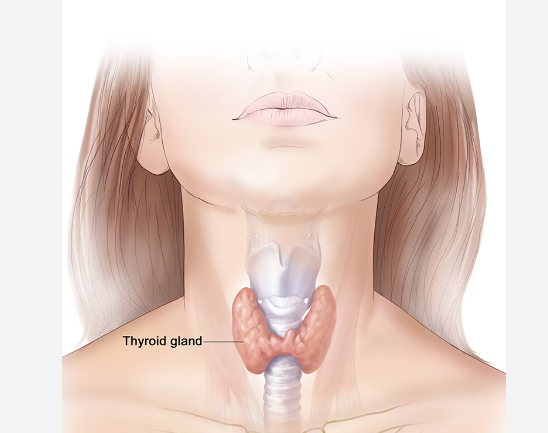.The thyroid is one topic I still feel jittery about as going through the journey myself was quite a roller coaster ride. I found myself feeling distressing symptoms without understanding their root cause. Despite my efforts, I was gaining weight despite a lack of proper nutrients, my hair was thinning, and I battled feelings of depression and constant fatigue. Mornings became struggle, lacking the energy to even rise from bed, and my self-confidence was lost. The visits to the doctor were largely inconclusive as the recommendations amounted to just working out and eating less.

After many months of suffering the doctor finally prescribed me TSH (Thyroid Test). Unfortunately, I was diagnosed with hypothyroidism and was advised to take medicine (a synthetic hormone to replace T4).
I, however, felt worse after consuming medicine for 3 months. As my symptoms persisted, I notice even more concerning changes: Increased hair loss, persistent lethargy, frequent headaches, and heightened anxiety. Despite being prescribed medication, I found little relief, It left me questioning the purpose of taking it if my condition remained unchanged. The cycle of discomfort seemed never-ending.
Answer remained elusive, leaving me frustrated and disheartened. It dawned on me that the medications I was prescribed merely addressed the symptoms, failing to target the underlying cause that continued to evade diagnosis

The thyroid, resembling a delicate butterfly nestled beneath the Adam’s apple, plays a pivotal role in our health despite its diminutive size. As the master gland, it secretes essential hormones, T4 and T3, crucial for regulating metabolism. However, a sluggish thyroid disrupts enzyme activity within our cells, impairing nutrient absorption and leading to symptoms such as hair loss, muscle weakness, brittle nails, and persistent fatigue.
What is the Thyroid?
The thyroid, resembling a delicate butterfly nestled beneath the Adam’s apple, plays a pivotal role in our health despite its diminutive size. As the master gland, it secretes essential hormones, T4 and T3, crucial for regulating metabolism. However, a sluggish thyroid disrupts enzyme activity within our cells, impairing nutrient absorption and leading to symptoms such as hair loss, muscle weakness, brittle nails, and persistent fatigue.
Symptoms of Hypothyroid
Fatigue
Cracked Skin
Anxiety
Depression
Constipation
Muscle aches
Low immunity
Weight gain
Hair loss
Brittle nails
Puffy Face
Slowed heartrate
How Does This System Work
The pituitary gland which sits under the hypothalamus sends the hormone TSH (thyroid-stimulating hormone) as a signal to the Thyroid gland to produce T4 & T3. T4 is an inactive hormone which, after secretion, goes to the liver and drops one of its cells to become T3, an active hormone. For more information visit Dr. Berg’s you tube channel. https://www.youtube.com/watch?v=3ykJdD-W_n8
Hypothyroidism occurs when the thyroid produces an insufficient amount of hormones for the body’s needs, while hyperthyroidism arises when it produces an excessive amount.
Why wasn’t medicine effective for me
As mentioned before, medicine made me feel worse because my symptoms were only the tip of the iceberg. We still needed to get to the root cause. I was only tested for my TSH level, which is not even a thyroid hormone; it is a pituitary gland hormone that works as a messenger between the pituitary and the Thyroid. We needed to check if my body is making enough T4 & T3 cells. Or does the liver have all the equipment necessary to convert inactive T4 to active T3?
What Hinders the conversion of T4 to T3
Stress:
In times of chronic stress, the body increases its release of cortisol, a stress hormone. This heightened cortisol activity can disrupt the conversion of T4 to T3, redirecting T4 towards the production of reverse T3 instead. An imbalance of reverse T3, caused by prolonged stress can slow down metabolism and lead to other negative effects on health. Read the article on Mental Health, https://healthgoalsforall.com/mental-health-awareness/
Liver Dysfunction:
While your thyroid gland primarily produces T4 and a small amount of T3, the majority of the conversion from T4 to T3 happens outside the thyroid gland, mainly in the liver. Thus any impairment in liver function could potentially hinder the conversion process even if liver enzyme levels appear to be withing the normal range.
Gut Health Issues:
Your digestive system is another site where the conversion of T4 to T3 takes place. Disturbances in gut health, such as dysbiosis (an imbalance of bacteria), inflammatory bowel disease, or leaky gut, can diminish your body’s capacity to convert T4 into the active T3 hormones. Read the article on Leaky Gut, https://healthgoalsforall.com/228-leaky-gut/

Restricted Caloric Intake:
Low-calorie diets have the potential to harm thyroid function and significantly decrease T3 levels by as much as 50 percent. When calorie intake is severely restricted the bdy tends to convert thyroid hormone T4 into reverse T3, leading to decline in metabolism. This conversion serves as protective mechanism during periods of famine or food scarcity, aiming to prolong survival
How I Cured Myself
To achieve healing without medication, I knew I had to implement significant lifestyle changes. This involved overhauling my dietary habits, revamping my exercise routine, adjusting my sleeping patterns, and, importantly, refining my morning routine
What I meant by dietary habits: Read the article on Guide to good healthy habits, https://healthgoalsforall.com/a-guide-on-how-to-make-disease-disappear/
- Started keeping myself hydrated (a common symptom of hypothyroidism is constipation. A patient needs to remain hydrated).
- Added ginger, turmeric, cilantro, and cinnamon to help boost my metabolism which tends to slow down in this condition.
- Added nuts, seeds, legumes, oats, and eggs in my diet to provide minerals like zinc and selenium. Selenium and zinc play a vital part in the conversion of T4 to T3.
- Included Flax seeds, chia seeds, and hemp seeds to make provisions for Omega 3. Omega 3 can decrease inflammation in the body taking place due to hypothyroidism.
- A daily supplement of Vitamin D; a study found that people with hypothyroidism are more prone to vitamin D deficiency.
- Switched to coconut oil and pure ghee from saturated oils (coconut oil has a unique property of medium-chain triglycerides which help to increase metabolism and promote weight loss; pure ghee helps balance hormones).
- Started eating carrots, bell peppers, tomatoes, peas, and bottle gourd. These are antioxidant-rich vegetables that improve overall health.
- Frequent use of kidney beans, lentils, and chickpeas (a great source of sustained energy).
Change of Exercise Regime
Once a dedicated gym enthusiast, I thrived on weight training and vigorous aerobic workouts. However, following my diagnosis, I transitioned gradually to activities like stretching, yoga, and gentle cardio. This shift was necessary as my body struggled to cope with intense exercise, resulting in persistent aches and pains. Additionally, exertion triggers stress, elevating cortisol levels, which can hinder the conversion of T4 to T3, decrease TSH levels, and suppress thyroid hormone production.
Sleeping Patterns
I reached a point where I refused to compromise on sleep. Ensuring I got sufficient rest allowed my body the necessary time to rebalance disrupted hormones and feel gully rejuvenated.
As part of my morning ritual, I dedicated 30 minutes to meditation to sooth my nerves. I also made a conscious effort to cut back on caffeine consumption and completely eliminated processed foods, refined sugar, fried items, and sweetened beverages from my diet. This not only promoted gut health but also alleviated some of the strain on my metabolism.
During this period, I began taking medication on an alternating basis, reducing the frequency to three doses per week, and eventually discontinued it altogether after three months.
This marks my journey battling with hypothyroidism, where I endeavored to share every detail in the hope all of you can take something away from this.
I encourage you to engage in dialogue with your healthcare provider to craft a comprehensive strategy aimed at addressing the root cause of your issues rather than merely alleviating symptoms.